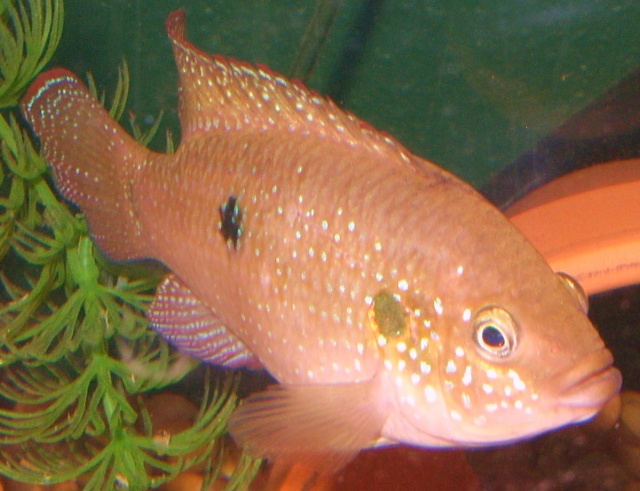Jeweled cichlid

Scientific Name(s): Hemichromis
Common Name(s): Jewel fish, African Jewelfish, Two Spotted Jewel Fish, Green Jewel, Blue Jewel
Origin: A native species to Central and West Africa.
Family: Cichlidae
Species Type: Hemichromis bimaculatus
Maximum Size: 5.5 inches (14 cm)
Life Span: 8 years or more
Natural Habitat: They are found in the muddy, sandy or gravel bottomed creeks, streams, rivers and lakes of Central and West Africa. They are common in a variety of water qualities including brackish water
lagoons.
Diet: Carnivorous, but they do well on many different prepared foods such as flake, floating/sinking pellets and algae disc, so you will want to make sure that your bottom feeders are getting enough to eat as well. With a little patience you can train them to eat right out of your hand. Mine will at times rest in the palm of my hand and eat small pieces of worms.
Temperature: 70 – 78F (21 - 26C)
PH: Range 6.5 - 7.5
Minimum Tank Size: 30 gallons (136 liters) For breeding or if you plan on having mates to keep your Jewel company, then you will need a larger aquarium. When kept in cramped conditions these guys turn in to little beasts.
Tank Region: They love to explore so you will find them in all regions of your aquarium.
Temperament: They have a reputation for being aggressive and territorial when kept in small aquariums and when breeding, but when kept in the proper conditions there relatively peaceful towards other species. Avoid keeping them with small timid species as they will harass them and if small enough to fit in their mouths, they will eat them.
Possible Tank Mates: Some mates to consider are the South and Central American cichlids, Barbs, Danios, Silver Dollars, Cory cats as well as many different sucker mouth catfish.
Filtration and Setup: The Jeweled cichlid is a very hardy species. They do best in well oxygenated, softer more acidic water with caves, fake or hardy live plants, such as Amazon sword plants, Anubias, Java fern and crinum for cover. They have been known to dig know and then so fake plants are recommended. A substrate of sand or fine gravel will help them feel at home.
Sexing: Males are usually more colorful with pointier anal and dorsal fins. Females are usually smaller. It can be tricky tell one from the other. Male will mate with only one female for life. If you intend on breeding the Jeweled cichlid keep in mind that if the female is not mature enough to spawn, the male could kill her.
Breeding: During the spawning season, this species becomes very aggressive. They are even known to bite the hand that feeds them. A 30% water change and maintaining a tempature of 78F (26C) should trigger thier spawning instincts. No other fish than the breeding pair should be introduced in the tank at this time. They will choose a flat piece of rock, flower pot or even the glass of the aquarium to lay their eggs. Once released, the male fertilized the eggs. As much as 600 eggs can be released by one female. After the spawning process, the pair digs a new home in the substrate to raise their fry. The fry is transported in the mouth of the female. Both the male and the female are very careful with their offsprings. When one is taking care of the fry, the other watches the nest and vice versa. Both raise the fry. The eggs hatch in three days and are free swimming after 4 days. The fry are now big enough to be fed with crushed flakes and baby brine shrimps. It is best that the parents are removed after a week, before they get into another spawning cycle.







